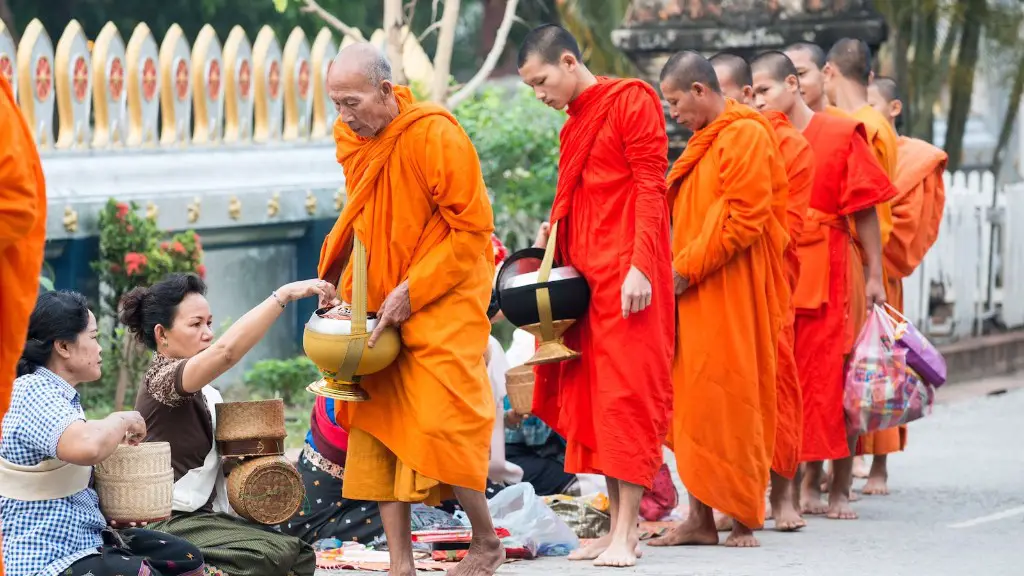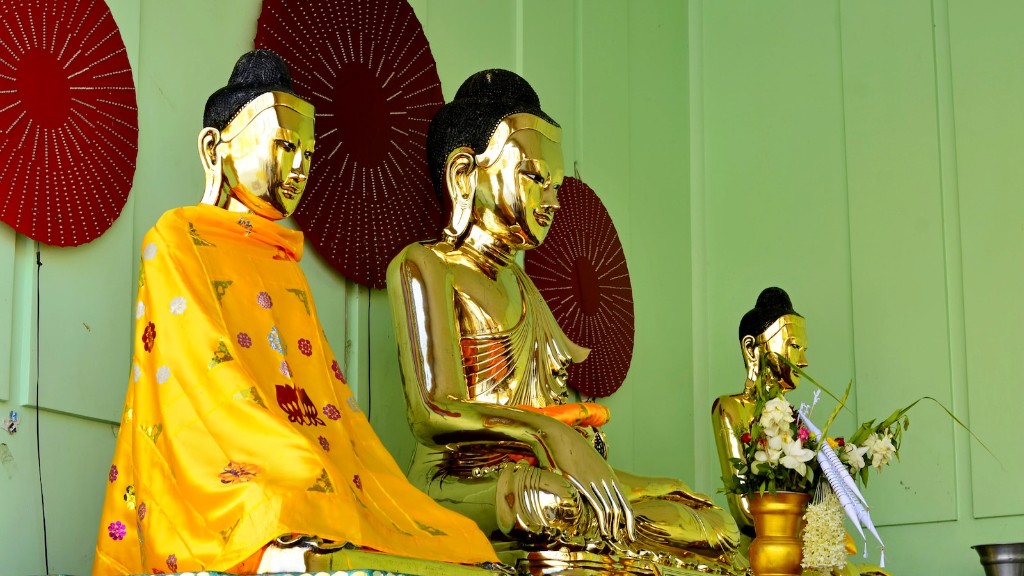Definition of Dharma
Hinduism is a complex and ancient faith with a variety of teachings. One of the most central concepts of Hindu philosophy is Dharma, which is often translated as ‘righteousness’ or ‘duty.’ It conveys how one should live a moral and spiritual life. In Hinduism, Dharma is not just a matter of personal ethics alone, but rather a way of life that seeks to be in harmony with the divine order or cosmic will.
In Sanskrit, the word Dharma is derived from the root dhr, meaning ‘to hold’ or ‘be firm’ in one’s adherence to moral and ethical principles. Refraining from behavior that causes suffering for yourself or for others and honouring truth are essential to leading a Dharma-based life. Similarly, Dharma also calls for upholding values and ideals such as kindness, compassion, and respect.
Living According to Dharma
Following Dharma is essential for truly being fulfilled in life. According to Hinduism, achieving peace and joy comes from moving away from a sense of selfishness and materialism, and understanding the spiritual and ethical obligations that are at the heart of Dharma.
It’s often said that Hinduism is less a religion and more of a way of life. Striving to live one’s life according to Dharma is considered the highest religious goal, while conversely, a life that is against Dharma will bring suffering and karma. The Bhagavad Gita, a revered Hindu text, states that the soul must be separated from the physical and mental temptations, and to follow the path of Dharma is the universal way to restore balance and transcend into the divine.
Roles of Dharma in Hinduism
Dharma plays many roles in Hinduism, from the guidance of human behavior to the preservation of nature itself. Dharma is seen as providing guidance to individuals on their spiritual journey, and it is also viewed as essential for the functioning of the entire universe. In Hinduism, cosmic order is represented by Dharma, and it serves as a universal code of conduct for the entire cosmos—both natural and supernatural.
The concept of Dharma is further separated into four duties, known as Purusharthas. These are:
- Dharma: moral and religious duty
- Artha: Economic activity or material wellbeing
- Kama: Fulfilling desires
- Moksha: The liberation and attainment of bliss
These four duties come together to create a complete lifestyle, which is often referred to as Sanatan Dharma or “eternal dharma.” Sanatan Dharma is the sum total of the right behavior, according to scriptural and traditional teachings, to ensure the highest wellbeing of a person. Ultimately, it is the realization of a life lived according to Dharma that brings true fulfillment, peace, and joy.
Practicing Dharma
Dharma is an essential part of Hinduism and can be practiced in a number of ways. Meditation and reflection are key, as is following scriptural teachings. One of the most powerful practices is Yoga, which centers on breath control, simple meditation, and the adoption of specific bodily postures.
Yoga helps to create a connection between the material and spiritual worlds, enabling one to go beyond the physical and mental body and connect to something greater. In order to reach divine consciousness, one must move towards Dharmic living. This includes not just following the various roles of Dharma, but recognizing one’s intrinsic part in the larger cosmos.
Realizing Life’s Purpose
Realizing one’s Dharma and destiny is at the heart of Dharma in Hinduism. Dharma is less a code of ethics, and more an understanding of what a person ought to be. It is not merely a means of achieving conventional goals, but rather a way of self-development and enlightenment.
Every person has a unique destiny and purpose in life, and following one’s Dharma is essential for fulfilling it. One of the prime objectives behind living a Dharma-based life is to transform the nature of human psychology and create a better association with the wider cosmos. To live in harmony with Dharmic principles is to develop a connection with the ultimate reality and to experience true joy and liberation.
Influence of Karma on Dharma
Karma and Dharma are often mentioned together in Hinduism, and it’s worthwhile considering how the two work together. Karma can be defined as the law of cause and effect, with any action resulting in myriad consequences. Dharma is more concerned with the intention behind an action, whereas karma deals more with the results.
Karma is often described as a spiritual force that binds us to our physical world, and the natural result of dharma-based living is good karma. A life lived in accordance with Dharma is believed to ultimately attract blessings, good luck, and spiritual progress. Through the practice of Dharma, individuals can make progress towards moksha, or enlightenment, on their spiritual journey.
Achieving Dharma
At its core, Dharma is not much of an external code of conduct, but rather an internal one. Dharma is intrinsic to Hinduism and has to be observed in each individual’s own context and lived experience.
Living according to Dharma requires effort, but it is believed it brings a kind of inner peace and a deeper level of understanding and fulfillment. It is the only true path to moksha, or liberation, and is the key to achieving a meaningful and purposeful life.
Dharma and the Role of the Guru
Having a Guru is considered essential for following Dharma. A Guru is an enlightened person who has achieved self-realization and can act as a spiritual guide. A Guru helps an individual to better understand Dharma and to live a more ethical and spiritual life.
A Guru helps to set a path for a person and provides support and spiritual guidance along the way. Relying on the Guru to reveal the true nature of Dharma can help one to directly experience the divine.
Preserving Dharma
In order to preserve Dharma, it is not only important to learn, understand and uphold its moral principles, but also to understand its spiritual significance. One must be conscious that Dharma is a universal code of conduct that unites humanity and leads to greater harmony and balance in the world.
In Hinduism, Dharma is not to be taken lightly and must be observed with respect and discipline. No one should be forced to follow Dharma, and it is to be practiced freely and without coercion. It is through establishing a Dharma-based life that one is able to experience true peace and bliss.
Dharma in Everyday Life
Dharma can be infused into everyday life in various ways. One of the simplest ways is to strengthen one’s relationship with the divine. This includes spending time practicing spiritual rituals, religious readings, and reflections. One should also practice living a spiritually focused life through moral behavior, such as helping those in need or being generous and compassionate to others.
Living a Dharma-based life calls for going above and beyond physical needs and accessing a higher state of consciousness. It is important to strive for a higher good and practice noble values, such as truth, justice, and courage.
Balancing Dharma and Wealth
At its core, Dharma is a spiritual path, not a materialistic one. The purpose of Dharma is not to make a person wealthy or achieve worldly prosperity, but to achieve spiritual progress. To lead a Dharma-based life, one must strive for a balance between material comforts and seeking a higher spiritual purpose. Dharma must remain the main focus, rather than becoming ensnared in a materialistic lifestyle.
To practice Dharma, one must strive to stay focused on one’s spiritual journey. Fulfilling one’s Dharma is the ultimate goal, and any material comforts must be kept within healthy limits. Dharma must be kept at the forefront in order to make strides in one’s spiritual development.
Conclusion
At its core, Dharma is a path of spiritual enlightenment and self-transformation. Dharma provides guidance on living a moral and truly meaningful life. It is essential to recognize and live according to Dharma in order to make progress in one’s spiritual journey and experience true liberation. By living according to Dharma, one is able to live in harmony with the divine order and fulfill one’s highest potential.

